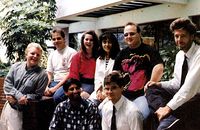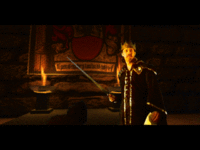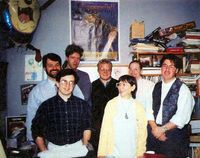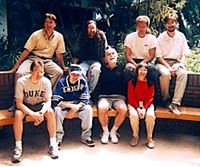General:Julian Lefay
| Julian Lefay Father of The Elder Scrolls | |
|---|---|
| Role(s) | Director, Programmer, Designer |
| Bethesda Softworks tenure | 1987–Sep 1998[1][2] |
Julian Lefay (b. 1965) also known as Julian Jensen was the core game director, programmer, and designer at Bethesda Softworks in the late 1980s and 1990s.[1] By 1997 or earlier, Lefay was dubbed the Father of the Elder Scrolls by the fans and the company itself.[3] The God of Wisdom and Logic, Julianos, was named after Julian Lefay.[4]
History[edit]
During the early 1980s, Lefay began programming and quickly became known as one of the best Amstrad and Amiga programmers during the high period of Commodore's success. His programs have won numerous industry awards in virtually every category. Julian Lefay joined Bethesda shortly after its creation in 1987 and eventually became Chief Programmer. At this time, he was considered by many as one of the key technical people in the entertainment multi-media industry as he combined a rare mix of programming knowledge and computer language skills with proven design capability and music composition experience.[1]
Lefay was a noted enthusiast of roleplaying games and leveraged his standing at the studio and his programming competency to push for the company to start making roleplaying game software for computers.[5] Lefay was considered the chief imagineer behind The Elder Scrolls series during his tenure of the studio, being the project director behind Arena, Daggerfall, and Battlespire -- contributing to the programming, gameplay mechanics, and lore design of the series.[4]
Around the release of Battlespire in 1997, Lefay transitioned to prototyping designs for The Elder Scrolls III and The Elder Scrolls IV.[6][7] But those projects were put on hold due to other internal teams still needing staff, so Lefay began work on a small kids game called Dollhouse (that was cancelled later) while waiting for folks to be freed up. However, another team was given the greenlight to start work on The Elder Scrolls III again before he had finished his side project, and he had strong creative differences with what the new team had been cooking up in his absence – both in terms of design direction and the fact that they were choosing not to continue the generated game style of Daggerfall and instead focus on entirely handcrafted games.[4][8] In September 1998, Lefay departed Bethesda Softworks.[2] Lefay reflects that he had no real design input on Morrowind as he had had on previous games,[4] though he reportedly had a role in designing an earlier iteration of the game when it was called Tribunal and took place in the Summerset Isles.[9] Lefay is happy that the series he started has enjoyed such staggering success and he's happy that Todd Howard was the one to succeed him as the torch bearer of The Elder Scrolls.[10]
He is currently a co-founder and technical director of a new games company called OnceLost Games, and is presently working with Ted Peterson in creating a spiritual successor to Daggerfall.[11]
Elder Scrolls Game Credits[edit]
Video Games
- The Elder Scrolls: Arena — Programmed and Directed by[12]
- The Elder Scrolls II: Daggerfall — Project Leader / Programming / Design[13]
- An Elder Scrolls Legend: Battlespire — Lead Programming / Design and Dialogue[14]
- The Elder Scrolls Adventures: Redguard — Special Thanks To[15]
- The Elder Scrolls III: Morrowind — Special Thanks To[16]
Books
- The Daggerfall Chronicles — Additional Material[17]
Known Contributions[edit]
These lists are non-exhaustive and only include contributions of which Lefay is known to have been the primary author.
- Arena — Lefay, alongside Vijay Lakshman, Ted Peterson, and the rest of the team, named and developed various setting materials to establish the series, including the game world and maps of Tamriel.
- Camoran Usurper — Lefay ran a D&D campaign with a group of developers at Bethesda; which was set in High Rock and centered around the rise of an usurper who was conquering the lands of Tamriel, in which he coined the Direnni family.
- Daggerfall CES Cinematic — Lefay helped produce the movie, and plays the role of King Cameron.
- Daggerfall — Lefay was the head of the project, and served as it's chief creative director and programmer. Additionally, Lefay narrated all the game's cinematics, and provided voice acting for King Lysandus.
- Battlespire — Lefay was the project leader and lead programmer behind Battlespire. Lefay authored the game's overall design, setting, and story. And Lefay provided voice acting for the Xivilai Moath, the Hernes of Havoc Wellhead, as well as the Daedra Counts of Dagon's Hunting Lodge.
- Morrowind — Lefay did not contribute to the design of Morrowind like he had with previous games, though he did return after his departure from Bethesda to consult on 3D programming techniques.
Interviews[edit]
- Feb 1994: Compuserve: Arena Conference
- Jan 1996: The Games Machine: Speciale Bethesda Softworks Report
- Nov 1996: PC Games Magazine: Julian LeFay im Gespräch
- Sep 1997: Boot Magazine: The Elder Scrolls: Battlespire Preview - A deadly alternate reality
- Oct 1997: Gamepen: Interview with the Bethesda Softworks' Elder Scrolls Team
- Oct 1997: Next Generation Magazine #34: Battlespire
- Oct 2017: Indigo Gaming: Interview with the "Father of the Elder Scrolls"
- Nov 2017: Reddit: Julian Jensen AMA
- Apr 2020: OnceLost Games: LIVE AMA | Ask Us Anything!
- Apr 2022: PCGamesN: Before Skyrim: the Elder Scrolls games that nearly broke Bethesda
- Jan 2025: Wayward Radio ep. #1- An Interview With The Fathers
See Also[edit]
- Julian Lefay's Posts — Posts by Lefay about The Elder Scrolls on various platforms
Gallery[edit]
Lefay as King Camaron in the Winter CES 1995 preview video for Daggerfall
External Links[edit]
References[edit]
- ^ a b c bethsoft.com
- ^ a b m0use.net/darius
- ^ Battlespire Pre-Release Interview
- ^ a b c d Ask Me Anything: I'm Julian Jensen, programmer, designer and "Father of the Elder Scrolls"
- ^ Ted Peterson's Posts
- ^ Electronic Press Disk: THE PEOPLE OF BETHESDA
- ^ Douglas Goodall's Posts
- ^ Indigo Gaming: Interview with the "Father of the Elder Scrolls"
- ^ Michael Kirkbride's Posts
- ^ Julian Lefay's Posts
- ^ "Wayward Realms". Retrieved 12 April 2021.
- ^ Arena: Credits
- ^ Daggerfall: Credits
- ^ Battlespire: Credits
- ^ Redguard: Credits
- ^ Morrowind: Credits
- ^ Daggerfall Chronicles: Credits






